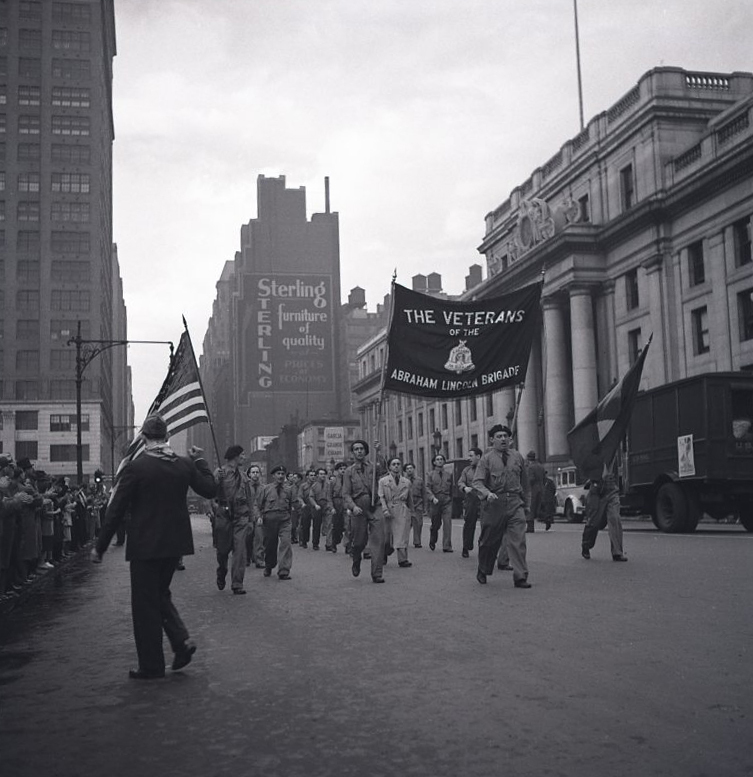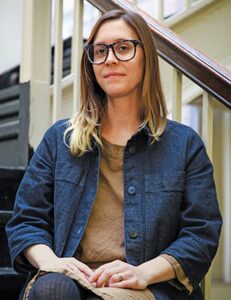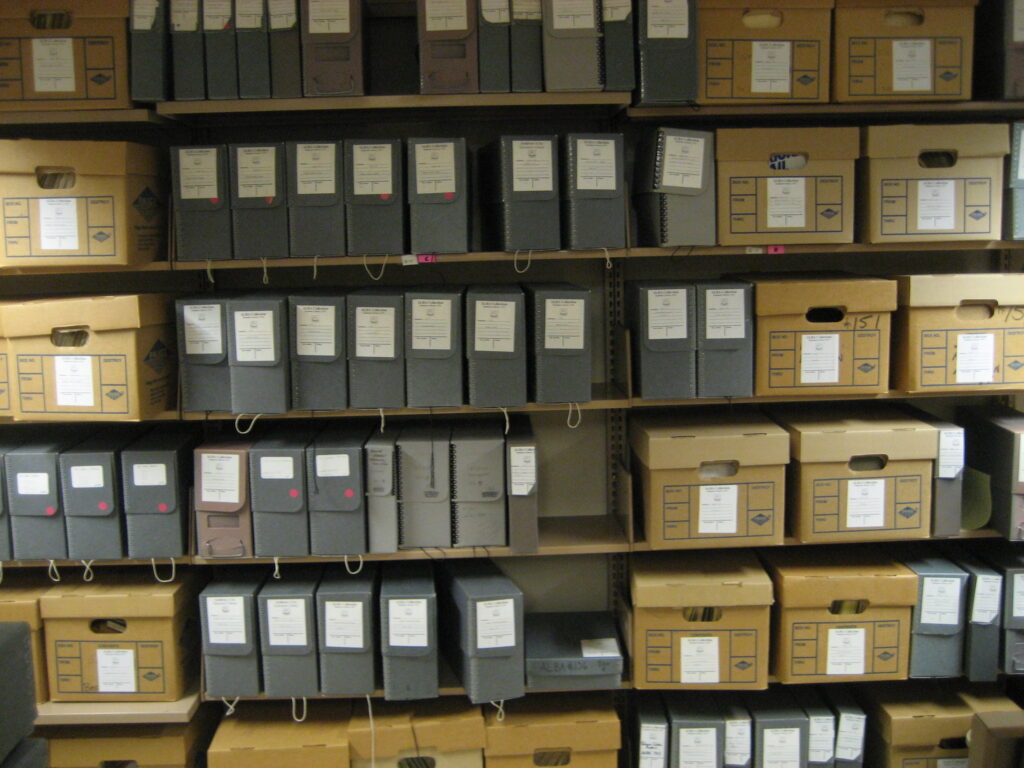New ALBA Collections Available Online As Tamiment Tackles Difficult Digitization

John Albok, May Day, Union Square “To Aid Spain Technical Staff of Committees to Aid Spain — Lincoln Brigade”, Shoot ID: 272 Negative: 69. Tamiment Library/Robert F. Wagner Labor Archives.
The ever-expanding ALBA collection, which has been housed at NYU’s Tamiment-Wagner Library since its transfer from Brandeis University in 2000, is now increasingly available online. The slow but steady efforts to digitize materials—archival-quality preservation and transfer is a time-intensive, painstaking process—have focused primarily on graphic and audiovisual objects: not only photographs, posters, and postcards but also video and audio. (See below for a detailed overview of collections currently available.)
“One of our priorities is to preserve and digitize collections that are in danger of deterioration, such as VHS tapes, or that are in forms of media that have become difficult to access, such as reel-to-reel tapes,” says Shannon O’Neill, the Curator for the Tamiment-Wagner Collections. “At NYU, we’re tremendously lucky to have our own in-house specialists to do much of this work. Only in rare cases do we need to outsource, for example when we’re dealing with media for which we don’t have the proper vintage equipment.”
Recently, NYU’s preservation staff has been able to digitize and caption a collection of oral histories of prisoners of war that Lincoln vet Bob Steck and others recorded in the 1970s and 1980s in collaboration with Carl Geiser, author of Prisoners of the Good Fight (1986). These interviews, conducted in English and Spanish, were preserved on cassette tapes, which are notoriously prone to deterioration. The audio, captions, and transcriptions can now be fully accessed online, along with two presentations in which Steck explained the project to his fellow veterans.
I recently spoke about this project with NYU’s Carol Kassel, Senior Manager of Library Infrastructure, and Kim Tarr, Associate Director for Media Preservation.
How many hours’ worth of audio did you process for the Steck project?
Tarr: The tapes are each, on average, 53 minutes in duration for a total of 423 minutes, or a bit over seven hours.
In what state of preservation were the cassettes? Was there any need for physical restoration?
Tarr: The eight tapes that comprised the Robert Steck Audio Collection (ALBA A 104) are all standard 1/8-inch audiocassettes. One of the tapes exhibited a high-pitched sound that appeared to be recorded in. Another tape had a portion of the magnetic tape twisted in the plastic cartridge. This was corrected by removing the tape from the shell—but the tape crease affected a 15-second portion on both sides. However, we were able to capture the content, digitally reverse it, and then place the content in the appropriate section of each side.
Can you tell me about the transcription/captioning process? How much of it was done manually and how much through Artificial Intelligence and automated speech recognition?
Kassel: We worked with a company, Konch, to do the captions. They go through a two-step process. The first step is AI/speech recognition, which can be very accurate but often misses the most important words—so it’s accurate but not always useful. Then they have a process for assigning audio for human correction. We retrieve the edited transcripts when the human corrections are finished.
How much and what kind of processing did you have to do on the audio itself? I’m thinking of noise reduction or pitch correction.
Tarr: No speed changes or pitch shifting were required for this project. Additionally, no noise reduction was used on these cassettes. Any extra blank content was removed from the beginning and the end of the tape. And the audio levels have reduced slightly, so peaks level were at 0Db for access copies to prevent overmodulation.
Did the project present any other challenges from a preservation or digitization perspective?
Kassel: The captioning surfaced an interesting problem, which is that we don’t always have great metadata about the language of the item. In the past, this aspect has not affected our workflow, but it does now! Some of these items were first captioned as English, for example, when in fact they were primarily in Spanish. This meant we had to re-send them. Additionally, the AI/speech recognition process requires that you pick one language. It doesn’t know when the language changes, so it just keeps going as if it’s the same language that you picked at the outset. Such items require a lot more hand-editing at the end, as you can imagine.
If users find errors in the transcription, should they report them and, if so, how?
Kassel: Yes, they should report them. They can write to special.collections@nyu.edu with any comments about the collection.
The digitized materials from the ALBA collection that are available online include the following:
Photographs
Harry Randall: Fifteenth International Brigade Photograph Collection (ALBA.PHOTO.011)
Under the supervision of Harry W. Randall, Jr., the Photographic Unit of the 15th International Brigade was charged with documenting the activities of the Brigade during the Spanish Civil War. The collection consists of 3 reels and 1,832 images taken by the Unit from August 1937 to September 1938 and captures the daily life of the volunteers in combat, in the camps, and in the towns, villages, and across the rugged terrain where the Brigade trained and participated in the fighting. In addition, the collection documents political assemblies, congresses, celebrations and the everyday activities of the Spanish populace. http://dlib.nyu.edu/findingaids/html/tamwag/alba_photo_011/
Moscow: Selected Images (ALBA.PHOTO.177)
This collection of 1,048 images was selected from the International Brigades Archive in Moscow, Series 5: Photographs. They were originally produced in Spain by staff photographers of the International Brigades. The collection consists of copy negatives produced for and purchased by the Abraham Lincoln Brigade Archives in the mid-1990s. The collection includes group portraits, individual portraits and battlefield and non-combat scenes showing members and activities of the International Brigades (14th, 15th, 57th, 58th, 59th and 60th Battalions), and civilians during the Spanish Civil War. The only identified photographer is Major Vladimir Stefanovich, a Yugoslavian volunteer. Included are images of the International Brigades training, life in camp, the International Brigades Band, Spanish Republican military leaders, Communist Party leaders and distinguished visitors, including Langston Hughes, Ernest Hemingway, and Harry Pollitt. http://dlib.nyu.edu/findingaids/html/tamwag/alba_photo_177/alba_photo_177.html
John Albok Photograph Collection (PHOTOS.063)
The collection consists of 433 black and white negatives. These were shot from 1933 through 1968 and document May Day parades from 1933-1938 (a number of which were shot in New York City’s traditional gathering place for public protests and demonstrations, Union Square), Labor Day parades from the early 1960s, and demonstrations against the Vietnam War in 1968. Several of the images feature the Veterans of the Abraham Lincoln Brigade. https://digitaltamiment.hosting.nyu.edu/s/johnalbok/page/welcome
Posters and Postcards
Spanish Civil War Postcards (ALBA.242)
An ad hoc collection of 168 Spanish Civil War Postcards from ALBA.242 and several other collections. https://digitaltamiment.hosting.nyu.edu/s/spanish-civil-war-postcards/page/postcards
ALBA poster collection
An extensive collection of Spanish Civil War posters from Spain and other countries, of which a dozen are available online in high resolution. http://dlib.nyu.edu/findingaids/html/tamwag/alba_graphics_001/dscaspace_ref13.html
Oral History: Video
Manny Harriman Video Oral History Collection
Manny Harriman (1919-1997) was a veteran of both the Spanish Civil War (he served under his birth name, Samuel Nahman) and World War II who later pursued careers in tool and die making and publishing. Following his first return trip to Spain in 1977, Harriman became interested in the history of his fellow Spanish Civil War veterans. The collection consists of some 80 oral history interviews he began videotaping in 1985 with veterans and/or their surviving relatives and friends across the country. The collection also contains a small number of recordings of VALB political activities during the mid-1980s, particularly around aid to Nicaragua. In total, Harriman captured the personal histories of at least 180 veterans. The interviews cover veterans’ family histories, their motivations for joining the Abraham Lincoln Brigade, their experiences fighting in Spain and later in World War II, and their activities in subsequent years. https://digitaltamiment.hosting.nyu.edu/s/albafilms/page/manny-harriman-video-oral-history-collection
Arthur H. Landis Oral History Collection
Arthur H. Landis (1917-1986) went to Spain in 1937 as a volunteer with the 15th International Brigade and fought with the MacKenzie-Papineau Battalion. In 1967, Landis wrote The Abraham Lincoln Brigade, a general history of American volunteers in the Spanish Civil War, and later published Spain! The Unfinished Revolution, about the political complexities of the war. The Landis collection of audiotapes consists primarily of about four dozen interviews with American Spanish Civil War veterans conducted in the 1960s as part of his research for The Abraham Lincoln Brigade. https://digitaltamiment.hosting.nyu.edu/s/albafilms/page/arthur-h-landis-oral-history-collection
Media Entertainment, Inc. Oral History Collection
The documentary In Search of The Lincoln Brigade, produced by Media Entertainment, Inc., recounts the Spanish Civil War through the eyes of 11 Abraham Lincoln Brigade volunteers. This collection consists of videos and transcripts for 11 interviews conducted in 1996 for the documentary In Search of the Lincoln Brigade. https://digitaltamiment.hosting.nyu.edu/s/albafilms/page/media-entertainment-inc-oral-history-collection
Oral History: Audio
John Gerassi Oral History Collection
Journalist and scholar John (“Tito”) Gerassi received his MA at Columbia University and earned his doctorate at the London School of Economics. Among his publications are The Great Fear in Latin America (1965), The Boys of Boise (1966), and the biography Jean-Paul Sartre: Hated Conscience of His Century, (1989). The Premature Anti-Fascists: Oral History of American and Canadian Volunteers in the Spanish Civil War was published in 1986. This collection contains 227 audiocassettes consisting of 89 separate interviews with individual veterans that were conducted for Gerassi’s project. https://digitaltamiment.hosting.nyu.edu/s/albafilms/page/john-gerassi-oral-history-collection
Francis Patai Audio Collection
Frances Patai was an educator, writer, historian and feminist activist. Born in New York in 1930, she earned her bachelor’s and master’s degrees at the City College of New York in the 1950s and taught English and Communication courses throughout the City University of New York (CUNY) system. Patai was deeply concerned with human rights issues, in particular the rights and status of women, and in the last decade of her life she devoted her efforts to researching and writing a book on U.S. women medical personnel who volunteered during the Spanish Civil War. The oral histories that make up this collection are part of her extensive research material. The collection consists of interviews with volunteers from the Spanish Civil War, primarily the women who served as nurses. Four have been digitized: Hilda Roberts Bell, Mildred Rackley Simon, Fredericka Martin, and Marion Merriman Wachtel. https://digitaltamiment.hosting.nyu.edu/s/albafilms/page/francis-patai-audio-collection
Robert Steck POW interviews
Oral histories of prisoners of war that Lincoln recorded in the 1970s and 1980s, in English and Spanish. Seven tapes, more than seven hours’ total (see article above). Captioned. http://dlib.nyu.edu/findingaids/html/tamwag/alba_audio_104/dsc.html
Letters and ephemera
The James Lardner Papers
James Lardner (1914-1938) was a journalist who enlisted in the Abraham Lincoln Brigade to fight against Franco’s rebel forces in Spain. In March of 1938 Lardner traveled to Barcelona and after observing the war firsthand, resolved to enlist in the Abraham Lincoln Brigade. He was killed in action in September 1938. The collection consists chiefly of correspondence; most of it produced by Lardner during his time in Paris and Spain and addressed to his mother Ellis and his brother Ring. https://alba-valb.org/education/alba-digital-library/
The Herman Greenfield Papers
Herman ‘Hy’ Greenfield (1915-1938) was a native New Yorker who was killed in action in February 1938 at Segura de los Baños. The collection includes postcards, newspaper clippings, and letters. https://alba-valb.org/education/alba-digital-library/
The Miriam Sigel Papers
The Miriam Sigel Friedlander Papers consist of letters written by three individuals who fought and died in the Spanish Civil War. Ernest Arion, Harold Malofsky (Melofsky) and Miriam’s brother, Paul Sigel were acquaintances in New York City before traveling to Spain in 1937. Arion and Malofsky were involved in cultural and political activities with the International Workers Order. Sigel was politically active while studying Engineering at New York University. All three wrote detailed letters to Miriam Sigel (later Friedlander) about their travels to Spain, their social activities and military duties, and their experiences fighting in the battles of the Spanish Civil War. https://alba-valb.org/education/alba-digital-library/
The Marjorie Polon Papers
Marjorie Polon (1924-1977) a native of New York City, was the daughter of Russian Jewish immigrants. The Marjorie Polon Papers consist chiefly of letters from six American Abraham Lincoln Brigade volunteers (Bill “Mike” Bailey, Nathan Gross, Harry Hakam, George Kaye, Sydney Levine and William Van Felix) who fought together in the Spanish Civil War. Although Polon’s correspondents were strangers to her, the letters she wrote were clearly important to the men who received them and several of them responded in detail to her. The bulk of the letters were written in 1938 and provide descriptions of battles, bombardments, and the relationship between the international volunteers and the Spanish citizenry as well as commentary on the political situation in the United States. https://alba-valb.org/education/alba-digital-library/














